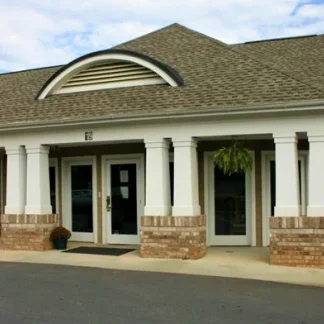Pavillion Greenville - Outpatient
Pavillion Greenville - Outpatient is a non-profit rehab located in Greenville, S...
Miracle Hill Renewal Center is a Christian faith based substance abuse recovery program in Greenville, South Carolina. This residential program is built on the 12 step model combined with Biblical principles. They serve adult women clients. The inpatient program at Miracle Hill lasts seven months and includes a transitional housing program following program completion. The program shows clients how to live a sober life through traditional coping skills and devotion to Christian principles. Services offered include:
The inpatient program has clients who live at the facility during the treatment program so they can be removed from outside distractions and have their needs tended to by staff. The residence has a relaxed, home like atmosphere. This is a 44 bed facility.
Clients follow a daily schedule of recovery activities during treatment. At Miracle Hill, these include individual therapy, life skills training, education groups, chapel services, Biblical study, and relapse prevention training. Clients also have access to healthcare services and a mentor program.
Transitional housing programs are designed to help clients who have completed a treatment program return to their daily lives by providing them with a secure, sober environment to live in before returning home. This gives clients time to practice the skills they learned in treatment, seek additional treatment, or make other arrangements before resuming independent living. Miracle Hill Renewal Center is a Christian faith based substance abuse recovery program in Greenville, South Carolina. This residential program is built on the 12 step model combined with Biblical principles. They serve adult women clients.
The inpatient program at Miracle Hill lasts seven months and includes a transitional housing program following program completion. The program shows clients how to live a sober life through traditional coping skills and devotion to Christian principles. Services offered include:
The inpatient program has clients who live at the facility during the treatment program so they can be removed from outside distractions and have their needs tended to by staff. The residence has a relaxed, home like atmosphere. This is a 44 bed facility.
Clients follow a daily schedule of recovery activities during treatment. At Miracle Hill, these include individual therapy, life skills training, education groups, chapel services, Biblical study, and relapse prevention training. Clients also have access to healthcare services and a mentor program.
Transitional housing programs are designed to help clients who have completed a treatment program return to their daily lives by providing them with a secure, sober environment to live in before returning home. This gives clients time to practice the skills they learned in treatment, seek additional treatment, or make other arrangements before resuming independent living.
Contact us for more information: (864) 242-2166

Connect with Miracle Hill - Renewal Center by calling their admissions team directly.
(864) 242-2166 Website Get DirectionsGroup therapy is any therapeutic work that happens in a group (not one-on-one). There are a number of different group therapy modalities, including support groups, experiential therapy, psycho-education, and more. Group therapy involves treatment as well as processing interaction between group members.
In individual therapy, a patient meets one-on-one with a trained psychologist or counselor. Therapy is a pivotal part of effective substance abuse treatment, as it often covers root causes of addiction, including challenges faced by the patient in their social, family, and work/school life.
Life skills trainings involve all the skills a person must have in order to function successfully in the world. These include time management, career guidance, money management, and effective communication. Truly successful addiction recovery is based on the ability to not only live substance-free, but to thrive. Life skills teaches the practical necessities of functioning in society, which sets clients up for success in life, and therefore sobriety.
In individual therapy, a patient meets one-on-one with a trained psychologist or counselor. Therapy is a pivotal part of effective substance abuse treatment, as it often covers root causes of addiction, including challenges faced by the patient in their social, family, and work/school life.
Life skills trainings involve all the skills a person must have in order to function successfully in the world. These include time management, career guidance, money management, and effective communication. Truly successful addiction recovery is based on the ability to not only live substance-free, but to thrive. Life skills teaches the practical necessities of functioning in society, which sets clients up for success in life, and therefore sobriety.
Life skills trainings involve all the skills a person must have in order to function successfully in the world. These include time management, career guidance, money management, and effective communication. Truly successful addiction recovery is based on the ability to not only live substance-free, but to thrive. Life skills teaches the practical necessities of functioning in society, which sets clients up for success in life, and therefore sobriety.
Pavillion Greenville - Outpatient is a non-profit rehab located in Greenville, S...
SCVRD Greenville is a private rehab located in Greenville, South Carolina. SCVRD...
The Phoenix Center is a nonprofit alcohol and drug addiction recovery facility b...
The Phoenix Center – Serenity Place is a women’s residential inpatient drug and ...